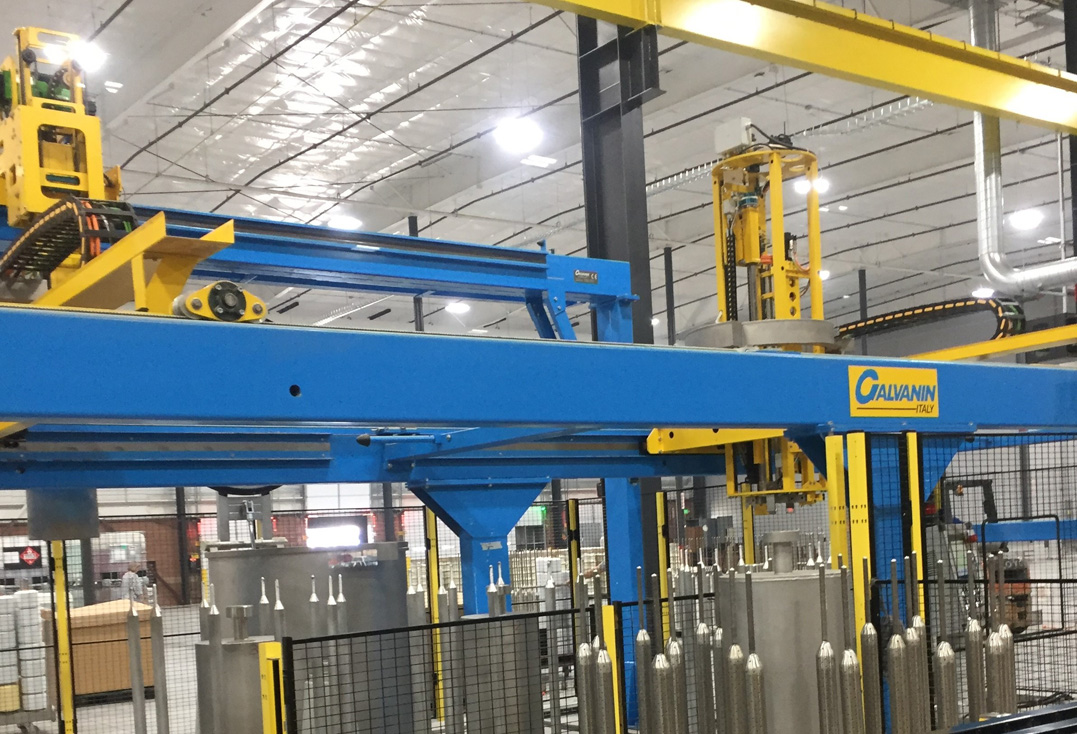Meridian Specialty Yarn Group, Inc. (MSYG), opened a new yarn dyeing plant at the site of its current operations in Valdese, North Carolina, USA.
The 116,000 square-foot facility is the first yarn and fiber dyeing operation to be built in the United States in over two decades and offers the only tow-dyeing capacity in the U.S., according to MSYG. Until this summer, all producer-dyed acrylic tow was imported from outside U.S. borders.
The plant officially went live July 8 and is equipped to provide a broad number of traditional capabilities, from chemical treatments to dyeing to a combination of the two. Utilizing next-generation technology, machines, controls and robotics for package, top and tow dyeing, the plant positions MSYG as North America’s most modern manufacturing operation with regard to dyeing technology and robotic support equipment.
Renovations are now taking place in the plant’s original manufacturing plant and when that is done, Meridian’s yarn dye operations – which also include several types of space-dyed yarns as well as twisting capabilities – will span both buildings and 284,600 square feet of office, warehouse and manufacturing space.
“Nothing like this has been built before in North America,” said Tim Manson, president of MSYG. “This is one of the only ‘green field’ yarn and fiber wet-processing plants to be built in the United States in a generation.”
“It’s also a showcase for next-generation yarn dye technology. This includes dye equipment by Galvanin, S.p.A. of Vicenza, Italy; a patented automatic dosing system for dispensing chemicals and auxiliaries from Color Service Dosing Technologies of Dueville VI, Italy; new monitoring and control systems for all of the new dyeing equipment from Adaptive Controls of Huntersville, North Carolina, USA; and a new Galvanin skein printing machine along with support equipment.
“Our new technology gives us the capability to process every dyeable fiber in various forms including yarn, tow and top. This is very unusual in the dyed yarn world,” said Manson.
“We can chemically treat or dye all fiber substrates, ranging from cellulosic and animal fibers, to polyester, nylon and dyeable aramids. Most dye houses specialize in certain products, but we are now in a position to source from all over the world, from every type of textile fiber, supporting a wide array of end uses.”
The package dye technology includes vertical, air pad, low liquor ratio machines that replace all of MSYG’s existing fully-flooded package dye equipment. The new acrylic tow dying capabilities will support the raw material needs at MSYG’s plant in Ranlo, North Carolina, and are also available to outside customers. The skein-printed yarns will go into craft yarns, apparel products and some home furnishings. The top dyed wool capability will support worsted spinners supplying high-end apparel, hosiery and home furnishings.
The new plant also reflects a large investment in sustainable technologies and processes. The end result is a facility that operates with considerably less environmental impact than other yarn dyeing operations both here in North America and abroad.
Meanwhile, despite installing a new generation of robotics, the company has added positions and is in the process of retraining employees to work with the new technologies.
“We’ve met the initial employment targets of adding 25 jobs and are hiring and retraining,” said Manson. “We did not lose any positions due to new technology.” Meanwhile, the company’s Human Resources Manager, Debbie Sigmon, has begun working extensively in the community and with the local community colleges to develop programs to train a new generation of textile workers, attract new talent to the region, and develop concepts for a workplace that appeals to a younger generation.
“It was important to us to keep manufacturing jobs in the United States while supporting the U.S. textile supply chain as well as the community where we’ve been located for so many decades,” Manson explained. “The new plant and the programs we’re working on in the community do all of the above.”
With all of this, he said, “We are very fortunate to have the ongoing support of our parent company, Meridian Industries. The owner of Meridian very much understands the important role manufacturing operations like ours play in the communities where we operate, as well as the importance of supporting U.S.-based textile operations. We are very proud to be part of Meridian Industries.”
The technologies in Meridian’s new manufacturing plant will also bring faster delivery to the North American supply chain for all the industries the company serves, including hosiery, home furnishings and upholstery, apparel, narrow fabrics, carpets and rugs, sewing thread, craft and industrial textiles.
“It’s very exciting and an achievement that has set the stage for a new future for our company, our customers and the North American textile industry,” Manson said. “Simply put, there is no other dye house in the Western Hemisphere that can offer a wider array of processes and capabilities than we can at this plant.”


